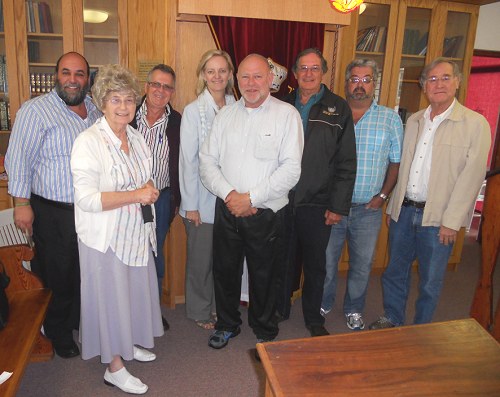|
Garden Route Jewish Association gives Jews in the area a sense of community - 27 NOVEMBER 2011
Over 3300 years ago Moshe Rabeinu (Moses) led the Jewish people out of the Wilderness and into their Judaism. On Sunday November 27, thirty three centuries later, his namesake, “The Travelling Rabbi” Moshe Silberhaft, figuratively took the Jews of the Wilderness - and Mossel Bay, Knysna, Plettenberg Bay, George, Oudtshoorn and the Klein Karoo – back into the fold of the Jewish community with the formal affiliation of the Garden Route Jewish Association to the SA Jewish Board of Deputies.
The brainchild of Myron Rabinowitz, chairman of the George Hebrew Congregation and of the GRJA, he explained his motivation for “taking the Jews out of the Wilderness” and approaching the neighbouring Jewish communities in 2007, when he was given the mandate to draw up a constitution. The GRJA met again in Oudtshoorn in June the following year, in Plettenberg Bay in January 2009 and in August of the same year in George. But the official rubber stamp of the SAJBD has given them a true sense of community, Yiddishkeit and belonging, which Rabbi Silberhaft stressed at the meeting attended by over 60 people in the shul of the George Hebrew Congregation. A relentless downpour had washed out a pre-planned picnic/braai on a beach in the Wilderness, with resultant quips that Rabbi Silberhaft had also brought rain to the previously drought-filled region, thus leading the community out of the desert. MC Howard Ross, of Knysna, said there were some 300 Jewish souls in the region “and then some who don’t come out of the woodwork”. It was agreed that the focus of the Association – which will now meet on a regular basis – would focus on getting together to “shmooze” and to drink a “l’chaim” on festivals such as Purim and Chanukah and celebrate Yom Ha’atzmaut and commemorate Yom Hashoah. Lexie Comay, the remaining resident of one of the oldest families of the Wilderness and George, gave a history of the area, explaining that the Wilderness had taken its name from a farmhouse built in the 1870s, with plots later being sold off and the original Wilderness Hotel built in the 1920s. Clifford Miller, a fourth generation Oudtshoornite, spoke of the two shuls built in the town, the rise of the ostrich farming industry and the close bonds between Jews and Afrikaners living in Oudtshoorn. He tabled an edition of the local newspaper, Die Hoorn, in which pages were filled with Rosh Hashanah greetings in the advertising section from members of Afrikaner-owned businesses and individuals. Miller said there were only 16 Jewish families remaining in Oudtshoorn, the majority of which kept kosher homes, with a shochet visiting every six weeks to provide kosher meat. Ann Harris, a vice-president of the African Jewish Congress, who drove up from Hermanus, said Jews did not move to country towns for the quality of Jewish life. They could, however, help to keep the Jewish flag flying. National chairman of the SAJBD, Mary Kluk, who came from Durban for the occasion, brought greetings from the Board. Quoting from the diary of the late Emeritus Chief Rabbi Cyril Harris, “For Heaven’s Sake”, she said community was a cornerstone to being a Jew. “We all belong to one another,” she added, pledging the support of the Board in the venture. Marc Freedman, chairman of the United Hebrew Institutions of Oudtshoorn shared his thoughts on the parsha of the week and thanked the organisers and speakers. |
